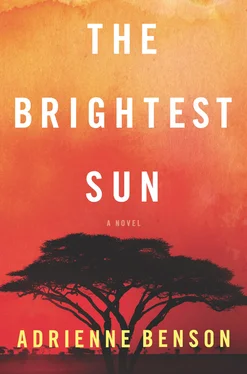“I found this for you near the river. Put some inside where the baby is.” And then she slipped outside again.
The leaves were rough and uncomfortable, and Leona worried they would somehow make her sick, poison her for her stupidity. But she slipped a few inside herself several times a day and waited for the relief of blood. It never came. Instead, her breasts began to hurt, she found herself thirsty and her jeans grew tighter and tighter. It was too late.
Leona considered driving to Nairobi to check herself into the hospital for the birth, but it was easier for her to force forgetfulness, and eventually she lost track of the days. There was work to do here. It had been a dry year and the year before had been dry, too. The Maasai in Loita were worried; cattle and goats had begun to get thin. Some of the baby goats had already died, their mothers too emaciated to produce enough milk. Years ago, the Maasai were free to go wherever the good grazing land was. In times of drought, they moved their herds a hundred and seventy miles to Nyeri, in the central highlands, where grass stayed greener and rains were more common. Under British rule, though, the government limited their movements and, with British settlers setting up their own farms, Maasai land was reduced further. The final nail in the coffin of the traditional Maasai way of life was the wildlife preserves. In the 1970s, citing the need for land and wildlife conservation, great swathes of Maasai land were designated as game parks. Grazing was prohibited.
Leona’s work was centered on discovering and mitigating the effects of the government-imposed strictures on the traditionally nomadic Maasai people in Western Kenya. She had the idea that if she could prove that the Maasai culture was changing, and that those changes would negatively impact Kenya in general, it would add fuel to the argument that the government should allow the Maasai more movement, more chances to keep herds healthy and more chances to survive. Her study was vital, life and death, and Leona took it that way—without the option of other grazing land, this culture could disappear as fast and as easily as the rivers and streams were drying.
She had no idea how pregnant she actually was. Thinking about how much time had passed made her panic, so she forced herself not to think about it, let alone plan for it. She hadn’t seen a doctor; she hadn’t had checkups. She spent the months trying to ignore her growing belly and forcing all thoughts of the future out of her head. She felt sick when the movements started—the tugging and sliding of her insides felt like a punishment. She watched Simi watching her grow, and when she let Simi place a hand on her moving belly, she wished fervently that the roles were reversed. After a while, the other women around her noticed, and that was a relief. They offered to help carry water and sent their own children to collect wood for Leona’s fire. And so it settled in—the silence, the forced ignorance. Leona worked constantly: watching the people around her and taking careful notes. The people in the village knew that she was there to observe their culture and way of life so she could write about them, maybe help them with the grazing problem. They knew her research meant she observed them and wrote in the notebook she always had with her, and that she asked questions incessantly about everything she saw. Leona began to draft what she planned to turn into her book, an academic study of the shifting cultural norms of the Loita Maasai brought on by laws limiting their nomadic heritage. She concentrated all her efforts on looking outward, and purposely pushed away what was happening inside.
That’s why her baby was born in the way of Maasai babies—in her dim inkajijik, the small hut made from thin branches covered with mud and dung. Only the embers in the fire pit lighted the birth, and when the baby’s eyes opened, they opened to a halo of wood smoke. The first face the baby saw was brown and wrinkled and adorned with strings of beads sewn onto strips of leather. The first sounds she heard were the women ululating four times to alert the village to the birth of a girl, their calls echoed by the lowing of cows.
Three days after the baby was born, Leona was curled around the infant on her bed. She was still so tired. She must have dropped off because the sound of a car engine and the shouts of people greeting one another outside slipped through her sleep. She lay still, for a moment forgetting everything, and grasped at the feeling of peace. It evaporated the moment she recognized one of the voices outside. When the tall blond man dipped his shoulders and neck to fit through her little door, she wasn’t altogether surprised. If he heard the story of an American giving birth, he’d know who it was. A white woman having a baby in a Maasai village would be big news. There was nobody else it could be. That he came, though, shocked her. She assumed he’d avoid further contact, eschew responsibility. But there he was, and for a moment Leona was stunned into silence.
“How are you?” he said. His English words, though flattened by his British-Kenyan accent, were startling in their familiarity. Leona tried to discern his reaction to the birth from his voice, whether or not he was angry. She concentrated hard, but her vision felt fuzzy and her thoughts flipped too quickly to pin down and consider. He was so handsome, and she remembered how her body stretched toward him that night, like a plant craving light. Even now, a part of her pulled toward him. She thought of how it felt to be pressed into him, how her head had spun with alcohol and need and how she’d wanted him, and how he’d wanted her, too. But the person she was that night in the Chabani Guest House, the woman who’d used flowery shampoo and worn her tightest jeans, the woman who had not walked away when the blond stranger spoke to her...that wasn’t the real Leona. It wasn’t her, she reminded herself as she looked up at the man. Her cheeks reddened and she wished, for the millionth time, that she could erase the previous months and erase that night and erase that rare, stupid version of herself.
The man leaned down and studied the sleeping baby.
“A girl?” he whispered, and reached out as if he wanted to touch the baby with his fingertips to check if she was real, but he stopped before finger met cheek. He glanced at Leona’s face and then away again. She couldn’t read him. He folded his lanky body and knelt on the dirt floor next to where she lay, up on the raised bed of rawhide stretched and dried to stiffness on a frame of sticks.
Watching the man now, here, in her home, Leona realized that although she had no idea what he was called, she knew a lot of other things about him. He’d grown up on a cattle ranch in Solai—close to Maasailand—and had a profound understanding of the Maasai and a fluency in their ways. He knew many of the elders in Leona’s manyatta. This was what had impressed Leona the night they met and caused her to feel that unfamiliar yearning stretch through her. He made her feel comfortable, so she didn’t hesitate when he gently picked her hand up off the bar and told her to follow him to his room. She liked his coarse blond hair and his sunburned, peeling arms that wrapped around her in the night, and his wide, calloused fingers rough on her breasts. While it was dark and they were breathing together that night, she let herself think about how it might be to have a man of her own—one she wanted—to lie with every night. She hadn’t wanted that before, but under the darkness of that night the thought was as exciting as it was terrifying.
In the weeks after she’d met him, though she knew she’d been clear to him, brutally so, perhaps, Leona found herself hoping through the hot, still days. She couldn’t shake the suspicion that something was different. In the golden evenings when the sun pulled colors out of the sky and turned the landscape soft and blue, she scanned the horizon around the manyatta for the telltale clouds of dust a Land Rover would make if it were hurtling up the track toward her.
Читать дальше












